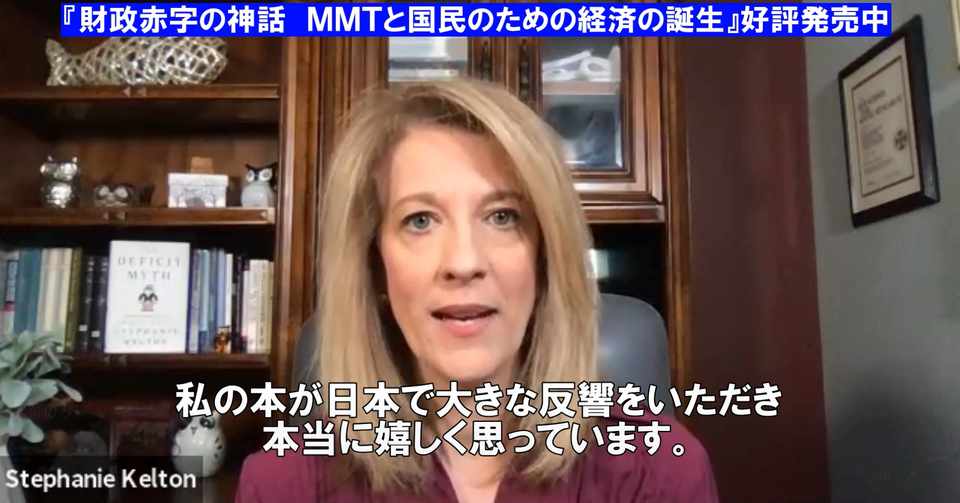1
so i look at it in a dispassionate way okay that doesn't get my temperature up to hear the word deficit i say well okay it's the difference between two numbers so if the government spends a hundred dollars into the economy but it only taxes ninety dollars back out we label that a government deficit and it gets recorded on the government's books minus ten deficit what we forget is that if they put a hundred in and they only take 90 back out somebody gets 10. so on the other side of the government's deficit lies a financial surplus in some other part of the economy
2
so what is the deficit it is nothing more than the difference between two numbers
it's the difference between two numbers one number is how many dollars the government spends into the economy each year
and the other number is how many dollars does the government subtract out of the economy each year okay
mostly by through taxation
so we use this word which is such a loaded word which i think gets to your question why do we care about it because the word itself is loaded right it it's a pejorative a deficit sounds like inherently problematic
nobody wants to have a death
3
if you're the issuer of the dollar can you ever run out the answer has to be no
can you ever have bills coming due social security medicare treasuries interest on the debt whatever it is can you have bills coming due that you can't afford to pay the answer has to be no
can you end up like greece with debt that you can't service the answer has to be no um
so it immediately takes you you know far afield from so much of the the mainstream discourse a lot of things that you thought were true can't be true
and so that's just like the beginning place and then you talk about well if that's true you know you start thinking about why does the government collect tax and we're used to thinking the government taxes us because it needs the money
but mmt shows that can't be right if you're the currency issuer you aren't taxing because you need the money
there must be some other reason for the tax so then you investigate that why do governments borrow
well they borrow because they have to finance the deficit no they don't
if you're the currency issuer the borrowing must be about something else the treasuries must be doing something else they're not financing the government so in a sense mmt changes everything that we think about the government's budget how it operates the role of taxes and borrowing and all the rest of it
4
you know i think that the answer for me is that it's just gut-wrenching to me as you know a citizen a mother a a person who cares about other people in the community and in this country and beyond just recognize once you realize that the suffering is gratuitous that's when it becomes impossible to accept
if there really were no alternative as margaret thatcher told us
you know there is no alternative (TINA) she famously you know gave us uh
if if the money just couldn't be there if we didn't have the capacity to do better and to improve lives for so many people without the need to really tear anyone else down i mean we have the capacity to do this so why tall why would you tolerate so many deficiencies and so much suffering across the economy why not have if it's if it's within reach why not deal with climate why not have the best educational system in the world that everybody can you know get access to
why not have everybody covered by health care and the best in the world why you know like why not have 21st century infrastructure housing that's available affordable for everybody
why not strive to do those things it can't be for lack of money
1
私は冷静に考えてみました 赤字という言葉を聞いても 体温が上がらないので 私は言いました 2つの数字の違いです 政府が経済に100ドル使っても 90ドルしか税金が戻ってこないとしたら 政府の赤字ということになり 政府の帳簿に記録されます 10の赤字ということを忘れていました 100ドルを投入しても 90ドルしか戻ってこないとしたら 誰かが10を得ることになります 政府の赤字の反対側には 経済の他の部分で 財政的な黒字があるのです
2
だから赤字とは何か、それは2つの数字の間の差以上のものではありません。
二桁の違い一桁は政府の経済への支出額
そしてもう一つの数字は 政府が毎年経済からどれだけのドルを 差し引いているかということです
ぜいぜい
だから私たちはこの言葉を使っています この言葉はとても負荷のかかる言葉です なぜ私たちはこの言葉を気にしているのでしょうか?
死にたくない人はいない
3
あなたがドルの発行人ならば 答えはノーでなければなりません
あなたは今までに手形を持っていることがあります 社会保障保険医療 国債 債務の利子 それが何であれ、あなたは支払う余裕がないことができる手形を持っていることができます 答えはノーでなければなりません
ギリシャのように借金を背負って終わりにすることはできますか?
それはすぐにあなたを連れて行くので、あなたが真実だと思っていた多くのことが真実であることはできませんので、主流の言説の多くから遠く離れて知っています。
それが本当ならば、なぜ政府は税金を徴収するのか、ということを考え始めます。
しかし、MMTが示すように、通貨の発行者であれば、お金が必要だから課税しない、というのは正しくありません。
税金には他にも理由があるはずなので、なぜ政府が借金をするのかを調査してみましょう。
借りてるのは 赤字だからじゃないのか?
通貨を発行しているのであれば、借入は別のことをしていなければなりませんし、国債は別のことをしていなければなりません。
4
私が思うに、私にとっての答えは... ...市民であり、母親であり... ...地域社会やこの国を超えて 人々を思いやる人であれば... ...苦しみが無償であることに気づけば... ...受け入れることができなくなります
マーガレット・サッチャーが言っていたように 本当に代替案がないとしたら 代替案はありません TINAは有名な話ですが 彼女は私たちにお金を与えてくれました もしお金がないとしたら... もしお金がないとしたら... もしお金がないとしたら... もしお金がないとしたら... もしお金がないとしたら... 私たちにはその能力があります なぜ背が高いのでしょうか 経済全体で多くの欠陥や 苦しみを容認するのでしょうか 手の届く範囲であればですが 気候変動に対処するのでしょうか 世界最高の教育システムを持つのでしょうか 誰もがアクセスできるようにするのでしょうか?
なぜ誰もが健康管理と世界最高のカバーを持っていないなぜあなたは、誰もが利用可能な手頃な価格の21世紀のインフラ住宅を持っていないように知っているのですか?
金にならないからといってそれをしないわけにはいかない
www.DeepL.com/Translator(無料版)で翻訳しました。
Who pays for it? It's a question you hear all the time, especially when we're talking about trillions of dollars in government spending.
And with the U.S. government operating at a $3.1 trillion deficit in 2020, it's an especially relevant question. But more and more, economists are beginning to wonder if it's worth asking. Since the U.S. issues its own currency, does it need to bother thinking about who foots the bill?
That's what we're exploring today on the show with Stephanie Kelton, professor, economist, author of The Deficit Myth, and face of the modern monetary theory movement.
You might not agree with what Stephanie has to say...but she'll certainly give you some food for thought. Listen now.
2020年10月27日 16:30
38.7 MB(オーディオ)






